
Malaysia looks to strengthen trade and investment both internally and externally
The Ministry of International Trade and Industry’s (MITI) history dates back more than six decades when the Ministry of Commerce and Industry was instituted in April 1956, a little over a year before the country’s independence.
The role of the Ministry was to facilitate the development of commodity businesses, particularly in tin and rubber. Upon gaining independence, the Malayan Government at that time sought to widen the country’s exports from mainly primary commodities to also include manufactured goods. In the 1960s, the country began to look into the import-substitution development strategy and come the 1970s, Malaysia became more involved in industrialisation due to the increasing number of Foreign Direct Investments (FDIs), especially in the Electrical & Electronics (E&E) sector.
Records of a well-rooted and diverse E&E industry is in its fifth decade of operations, having started with just eight component production companies in the 1970s, also known as the “8 Samurais”. The companies were National Semiconductor (now Texas Instruments), Intel Malaysia, Hewlett-Packard (now Agilent), Advanced Micro Devices (AMD), Bosch, Clarion, Litronix (now Osram) and Hitachi (now Renesas).
The maturity of this sector eventually led to the introduction of the Industrial Development Section and the expansion of the Trade Division within the Ministry. This outcome was an initial catalyst to the growing importance of MITI and its agencies in the Malaysian economy.
It was in April 1972 when the Ministry rebranded as Ministry of Trade and Industry and its scope at that time covered both domestic and international trade matters. More than 20 years later, on 27 October 1990, the Ministry of Trade and Industry was separated into two Ministries namely the Ministry of International Trade and Industry (MITI) and Ministry of Domestic Trade and Consumer Affairs.
Since then, MITI has been championing three core functions namely growing the Malaysian industries specifically manufacturing, promoting Malaysia’s international trade and attracting foreign (as well as domestic) investments. Surely, these core focus areas include developing supportive policies and the execution of various initiatives aimed at facilitating Malaysian companies.
It is important to have a glimpse of MITI’s history to understand its role in the present time. This gives a context on the significance of this Ministry and its agencies, namely the Malaysian Investment Development Authority (MIDA) and the Malaysia External Trade Development Corporation (MATRADE), as to how much they have contributed to the development of this beloved nation.
Attracting FDIs into Malaysia
MIDA, one of MITI’s main agencies, has always been focused on ensuring the long-term growth of Malaysia. Since the start of its operations in 1967, MIDA has been at the centre of industrial development in the country. The vast numbers of industrial establishments humming along efficiently throughout the country are testimony of MIDA’s success over the decades.
Over the last five decades, MITI and MIDA have assumed the critical and pivotal roles in contributing significantly to Malaysia’s rapid industrial development particularly in the manufacturing and services sectors.
MIDA as the principal investment promotion agency has been effective to target and attract the right types of investments, particularly FDIs, to transform the economic development of Malaysia:
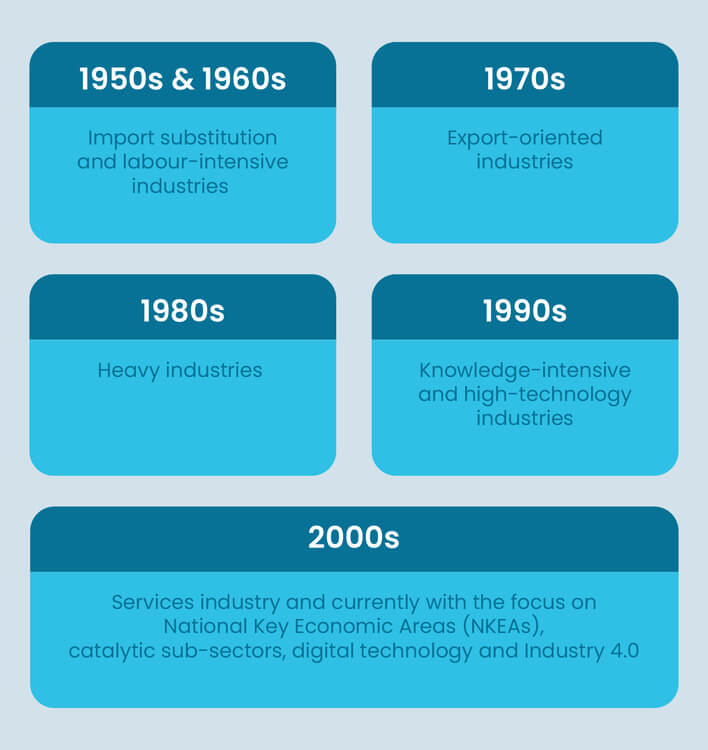
From 1980 until September 2020, MIDA has approved a total of 32,043 manufacturing projects with investments of RM1.37 trillion. Of this, the foreign investment amounted to RM751.17 billion or 55 per cent while domestic investment valued at RM614.58 billion or 45 per cent. These projects have created over 3.5 million job opportunities.
The indirect result of these projects, from both big and small, foreign and local companies, have generated far more jobs and business opportunities in the industrial and manufacturing sectors. This includes spin-off to other sectors such as hotel & tourism, real estate, logistics, retail, healthcare, education and banking & insurance.
Due to MIDA’s contribution to the growth of the manufacturing sector, the composition of exports for manufactured goods and its contribution to Gross Domestic Product (GDP) has also increased in importance.
In terms of GDP, the manufacturing sector is the second-largest contributor to Malaysia’s GDP at 23.5 per cent in the third quarter of 2020.
Strategic Approach in Attracting FDIs
Recognising the need to develop the high technology sectors to sustain economic growth and improve the competitiveness of the Malaysian economy, MIDA under the leadership of MITI has strategically scouted and attracted high value-added projects from around the world. In line with the national agenda, quality investments with a greater focus in the 3+2 catalytic sectors namely electrical and electronics; chemical; machinery and equipment; aerospace; and medical devices; as well as other potential new growth areas have been the nation’s priority.
While the COVID-19 outbreak has affected every country globally, Malaysia recorded a total of RM109.8 billion worth of approved investments in the economy (manufacturing, services and primary sectors) for the first nine months of 2020. These investments involved 2,935 projects and will create 64,701 job opportunities.
Every manufacturing and specified services project is thoroughly evaluated, deliberated and approved/endorsed by the National Committee on Investments (NCI), whose members consist of high-level representatives from not only MITI and MIDA but also Ministry of Finance, Economic Planning Unit, Inland Revenue Board, Central Bank of Malaysia as well as other relevant ministries and agencies.
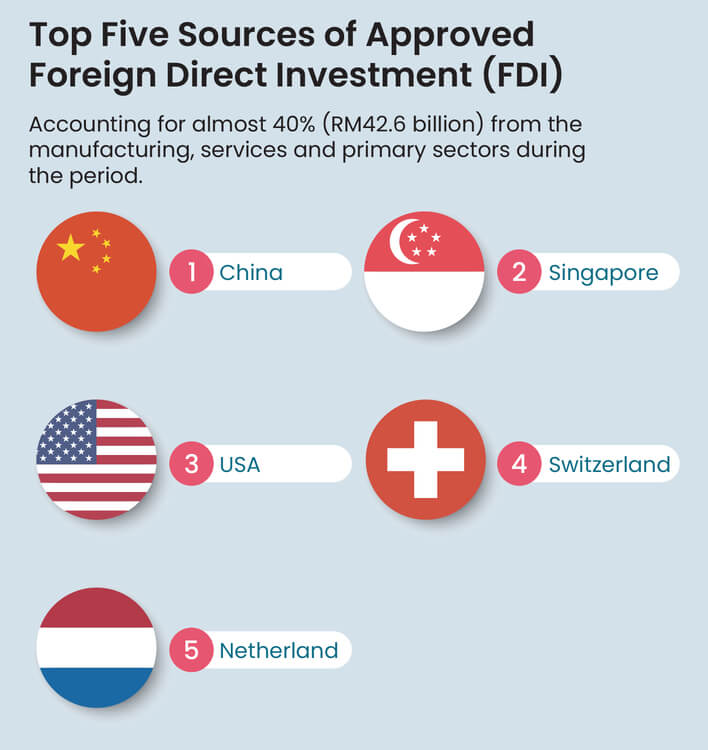
This is applaud-worthy given UNCTAD’s forecasts of global FDI flows to decrease by up to 40 per cent in 2020.
The manufacturing sector attracted the largest portion of approved investments for this period, contributing more than half (59.5 per cent) or RM65.3 billion, followed by the services sector with investments of 39 per cent or RM42.8 billion, and the primary sector with approved investments of 1.5 per cent or RM1.7 billion. Investments approved in the manufacturing sector for the period of January to September 2020 saw an increase of 16.6 per cent in capital investments compared to the corresponding period in 2019. It is important to note that, compared to the corresponding period last year, FDI in the manufacturing sector particularly saw an increase of 3.2 per cent to RM39.4 billion.
Within the manufacturing sector, in line with the Government’s strategies to attract investments in 3+2 industries, a total of 257 projects have been approved in the first nine months of 2020. These investments amount to RM20.7 billion or 31.7 per cent of the total investments approved in the manufacturing sector. Majority of these projects or 80.9 per cent were contributed by FDI.
The strong presence of FDI brought about by MIDA since early days of the country’s industrialisation has helped to upgrade and diversify the range of products and services and promoted the growth of local supply chain ecosystems and related services industry. Today, over 5,000 companies from more than 40 countries have made Malaysia their location for manufacturing and related services operations.
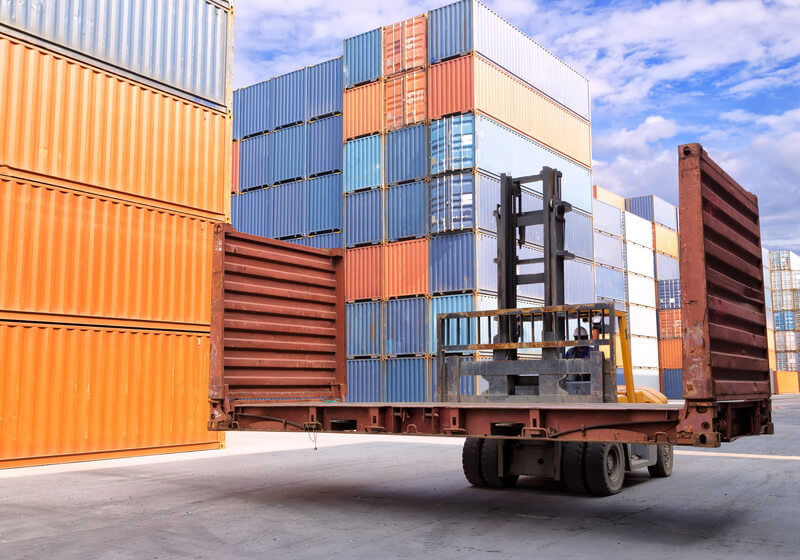
Malaysia has a robust and diverse supply chain
Malaysia has time and again proven its ability to meet the stringent demands of highly regulated industries, showcasing the country’s robust and diverse array of supply chains. It is reflected by the high-end FDI projects that Malaysia has secured in 2020. Among them include:
- Smith and Nephew from United Kingdom (UK) that will produce high-tech medical devices including knee and hip implants;
- A new project by Dexcom, a US company and leader in continuous glucose monitoring system will be producing their niche offerings in Malaysia;
- LAM Research, a US global supplier of innovative wafer fabrication equipment and services to the semiconductor industry that chose Malaysia to expand its global footprint by establishing its advanced technology production facility in Pulau Pinang;
- LEM, a Switzerland-based electrical measurement company will set up their new production plant in Malaysia to meet growing demand from its customers in the industrial and automotive sectors; and
- MusicTribe, a US-based multinational leader for professional audio products and musical instruments, on the other hand, is leveraging Malaysia to set up an Industry 4.0-driven, fully robotised manufacturing facility in addition to their Principal Hub activities.
Existing companies also continue to expand their operations in Malaysia, illustrating Malaysia’s on-going value proposition to investors. These include:
- Eppendorf, a leading German life science company that established an integrated centre for their shared services hub, covering functions such as IT, HR as well as Finance and Controlling, for the Group’s operations in the Asia Pacific, Middle East and Africa;
- Bosch, an existing German company for setting up a manufacturing facility park for testing of semiconductor components and sensors;
- B.Braun, an existing German company, expanded its global test centre for medical devices due to strong talent capability in Malaysia;
- Wistron, the Taiwan-based company engaged in the research and development, design, manufacture and sale of E&E products’ has acquired Western Digital's Petaling Jaya factory to undertake new business activities;
- Western Digital, a US company and the largest computer Hard Disk Drive (HDD), Solid State Drive (SSD) and flash memory devices manufacturers in the world announced their additional investments in Malaysia to design, develop and manufacture media and substrates for hard disc drive (HDD); and
- Nippon Electric Glass (NEG), a leading Japanese manufacturer of speciality glass has also expanded their production capacity of glass tubing for pharmaceutical use in Malaysia given the demand for its products following the vaccine roll-out.
The indirect result of these projects, from both big and small, foreign and local companies, have generated far more jobs and business opportunities in the industrial and manufacturing sector. This includes spin-offs to other sectors such as hotel and tourism, real estate, logistics, retail, healthcare, education and banking and insurance.

Malaysian-owned companies in significant industries urged to venture into high technology and innovation-based products and activities
Growing Domestic Investment
Through outsourcing in the manufacturing sector, for example, FDI has been driving technological change by nurturing Malaysian companies to jointly design and develop new products.
Through the growth of FDI, Malaysia’s domestic companies including the Small and Medium enterprises (SMEs) have flourished and are important components to the global supply chain. Some of them have even gone on to be publicly listed on Bursa Malaysia. The names include CCM Duopharma Biotech, Pentamaster Corporation, Press Metal Aluminum Holdings, ViTrox Corporation, JCY International, Globetronics Technology, Top Glove and Inari Amertron.
The significance of Domestic Direct Investment (DDI) in Malaysia is becoming more apparent over the years. In the first nine months of 2020 alone, the DDI was the leading source of investments in the economy; accounting for the majority share of 61.2 per cent, or RM67.2 billion.
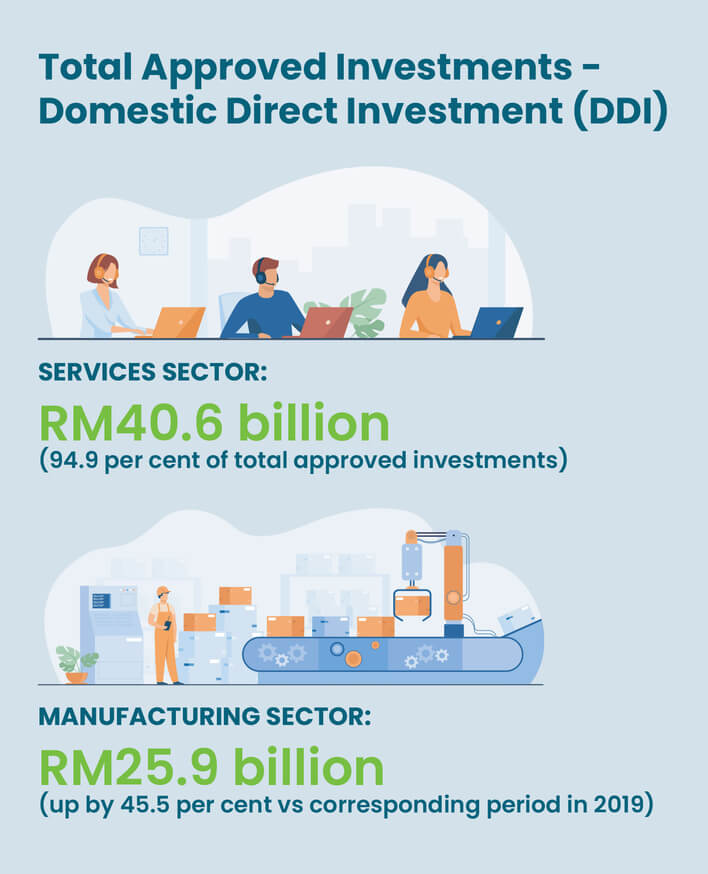
MIDA has undertaken several initiatives to facilitate domestic investments and advocate the development of supply chains between Malaysian companies with Multinational Companies (MNCs) and large corporations in the country.
MIDA’s relentless efforts in stimulating the domestic investment ecosystem have translated into the formation of a dedicated unit named Domestic Investment Coordination Platform (DICP). DICP plays an important role in providing support to the missing link between businesses and funding, technologies and research capability.
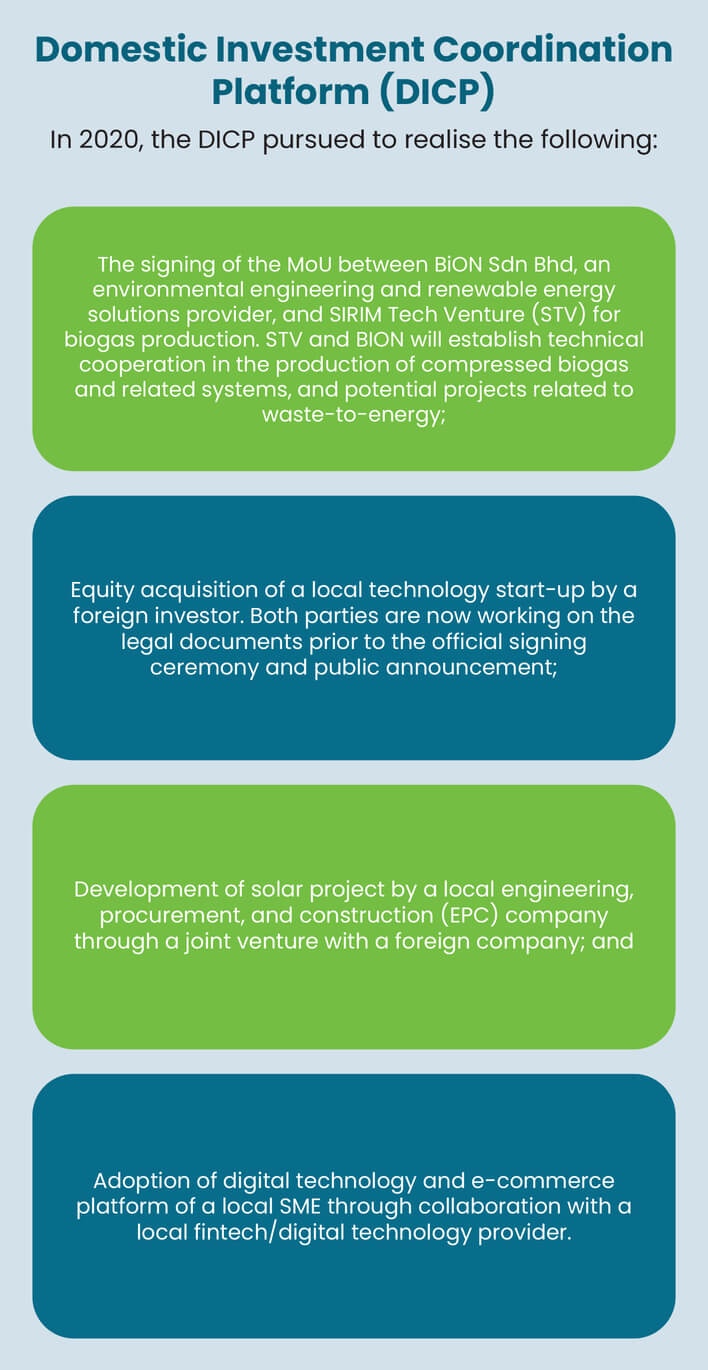
The signing of the MoU between BiON Sdn Bhd, an environmental engineering and renewable energy solutions provider, and SIRIM Tech Venture (STV) for biogas production. STV and BION will establish technical cooperation in the production of compressed biogas and related systems, and potential projects related to waste-to-energy;
Equity acquisition of a local technology start-up by a foreign investor. Both parties are now working on the legal documents prior to the official signing ceremony and public announcement;
Development of solar project by a local engineering, procurement, and construction (EPC) company through a joint venture with a foreign company; and
Adoption of digital technology and e-commerce platform of a local SME through collaboration with a local fintech/digital technology provider.

Malaysia’s domestic companies including the Small and Medium enterprises (SMEs) have flourished and are important components to the global supply chain
The Domestic Investment Strategic Fund (DISF) established in July 2012 was the main catalyst to call for Malaysian-owned companies in significant industries to venture in high technology and innovation-based products and activities. To date, MIDA has approved matching grants amounting to RM1.8 billion, involving 369 projects with a total investment value of RM16.9 billion. Local companies are taking the quantum leap in higher quality projects in driving the national agenda of transforming the domestic investment landscape.
A survey by MIDA on 22 companies having claimed the approved DISF grants over a period of 3 years, revealed increased outcomes in fixed-asset investment (104.4 per cent increase), new job openings (21.6 per cent), number of high-value careers (62.9 per cent), number of Malaysians trained (103.9 per cent), number of commercialised Research and Development (R&D) findings (121.7 per cent), number of registered Intellectual Property (IP) (26.8 per cent), export sales (225.2 per cent) and number of new markets (164.5 per cent).
MIDA also arranged various business matching sessions between anchor companies and potential local suppliers/providers within specific industries. In addition, engagement sessions were initiated between companies and potential funders, and technology providers. Domestic investment seminars on a quarterly basis are on-going to update local businesses on the government’s latest incentives and facilities in spurring DDIs.
The success of these initiatives is reflected by MNCs that have established vendor development and supply chain management programmes with local companies and suppliers. Examples of MNCs’ achievements in advancing local companies’ DDIs include:

More than 30 MNCs producing high value-added medical devices in Malaysia have successfully created and benefitted over 200 local SMEs in the medical device supply chain and ecosystem
- More than 30 MNCs producing high value-added medical devices in Malaysia have successfully created and benefitted over 200 local SMEs in the medical device supply chain and ecosystem. B.Braun Medical Industries has established a strong presence of local suppliers and businesses in its supply chain. Other major players, including Abio Orthopaedics Sdn. Bhd., Straits Orthopaedics (Mfg) Sdn. Bhd., Vigilenz Medical Devices Sdn. Bhd., Granulab (M) Sdn. Bhd., Hospitech Manufacturing Services Sdn. Bhd, and OSA Technology Sdn. Bhd. also established viable sourcing from local manufacturers and suppliers in overall advancing of the medical devices industry in Malaysia.
- Dyson Ltd., a United Kingdom-based producer of high-tech home appliances in Johor has injected billions of ringgit into the economy by outsourcing its production to local contract manufacturers such as VS Industry, SKP Resources and ATA. Dyson also shared the knowledge, skills and technology with its local suppliers to meet its high standards of quality. Over 15 million units of Malaysian-made bagless vacuum cleaners produced with the support of local manufacturers are exported to more than 75 countries worldwide. Some of its local suppliers have even expanded and transformed into large, public-listed companies.
- Lotte Chemical Titan, being the largest integrated producer of olefins and polyolefins in Malaysia, spends more than RM200 million annually for outsourcing activities within Malaysia. The company has engaged more than 500 local vendors and business partners in its ever-growing production.
- In addition to MNCs, Malaysia’s Limited Liability Companies, LLCs such as Petronas, YTL, Sime Darby, UEM, and Proton continue to support the development of local companies through business outsourcing opportunities in services, manufacturing or construction sector, both in Malaysia and abroad.
- Pentamaster Corp, a home-grown automated equipment manufacturer dedicatedly involved in the Penang Automation Cluster project, has taken numerous efforts to groom SMEs to produce high-quality precision machine parts. The company also joint ventured with two other local companies, Walta Group and ViTrox Corp, in this automation cluster initiative to strengthen the domestic supply chain.

Home-grown automated manufacturers have taken numerous efforts to groom SMEs to produce high-quality precision machine parts
Domestic companies should stride in with global manufacturing practices, given the rapid technological advancements in every business field. In this regard, Malaysia’s Industry4WRD policy championed by MITI is an excellent guide. The incentives of Industry4WRD Readiness Assessment and its subsequent Intervention Fund offered by the Government through MITI enable domestic companies to:
- assess their capabilities and readiness to adopt Industry4.0 processes;
- understand their present capabilities and gaps; as well as
- prepare feasible plans to move towards effective adoption of Industry 4.0.
Automation Capital Allowance (Automation CA), introduced in 2015 is another major incentive programme to motivate domestic companies to undertake automation and machine upgrading.
MIDA has also introduced the Lighthouse Project experimentation in enabling MNCs and local corporations, which have successfully gained from IR4.0 transformation, to guide and support Malaysia’s local manufacturing industries to also implement the Fourth Industrial Revolution processes in gaining business traction. As Malaysia aims to reposition among the top Global Manufacturing Nations, MIDA continues to identify and attract foreign and local companies that have successfully adopted the Industry4.0 key pillars to invest here.
MIDA strives to provide innovative engagements and collaborations with both foreign and domestic industries players towards the sustainable business environment and propel local businesses towards becoming global players. This will further attract more quality investments from both local and foreign sources and will also encourage innovation in new products. MIDA believes that the ecosystem approach is the best way to retain investors, as this offers a stronger reason for companies to remain and grow in Malaysia, particularly during this pandemic.












